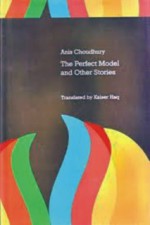| Book Review
Beyond Good and Evil
AHMEDE HUSSAIN
 |
The Perfect Model and Other Stories
Anis Choudhury
Translated by
Kaiser Haq
writers.ink;
Tk 350; pp 131 |
A confession, however embarrassing it is needs to be made first: the reason why I took up the rather dry and drab-looking book was not because of the writer but the translator of the work, Kaiser Haq. I am a big fan of Haq and his poems; I read two of his translated works--Rabindranath Tagore's Quartet (Heinemann International Literature & Textbooks; 1993) and Mirza Sheikh I'tesamuddin's The Wonders Of Vilayet (Peepal Tree Press; 2002), which have always made me wonder where the red line between prose and poetry is drawn; Haq's translation of Anis Choudhury's 18 short stories has not helped me with my awe of his prose; or marvel is the word perhaps.
Anis Choudhury (1929-1990) and his literary life span some important and interesting moments in history-- it was in the late forties, when the sun had finally set on the Empire in the Indian sub-continent, that Choudhury had started to tell stories. Behind him were an army of famous continental predecessors-- Robert Musil, Franz Kafka, Albert Camus and Robert Walser, and after reading the 18 stories, one can vouch for the fact that Choudhury was an avid reader of the four. The stories vary in their content and style. It is difficult to pin them down, but like his contemporaries, Choudhury remains true to reality, and every story in this collection is a testimony to that. He was gifted with the power of observation, that, too, of both inner and outer appearances of reality.
In some of these stories, he sharply dissects the changing relationships in the society and tries to find out the ever-evolving landscape of man-woman relationship. Of them, I have found "Wild Duck" the most interesting, which thematically deals with adultery. Set in a "voluptuous" evening and "a pert breeze drunk with the intoxicating fragrance of some wild blossom", it tells the story of Taimur, the lonely "custodian" of a dak bungalow on the Barak river. That night he comes across two guests--a man and his female companion. When the man is blissfully sleeping, the woman knocks on Taimur's door and asks for help. The plan is to take the man out in the morning in the pretext of hunting wild ducks, so that the woman, who was forced to come to the bungalow, can flee. The man dies in the quicksand, the girl, meanwhile, disappears only to turn up a few days later with a young man, who accuses Taimur of killing the girl's husband. After spending some days in prison, he meets her again. The girl questions his intention of saving her–
'"Why didn't you turn back? Why didn't you expose my scheme and force me to control my senseless desire?"
'It was getting dark. The girl's words became slurred.
'"Everything is quite meaningless. I too have become a wild duck. If I escape one hunter, it's only to fall into the clutches of another."'
Or imagine the life of Munir, who once dreamed of becoming a king and in his small little way he has become one. He is the PA to the GM, and without passing his "hallowed chamber" no-one can meet the big man in office. A lady turns up to his chamber one day and asks for her name to be told before the GM, and at the climax of "A King" Munir is scolded by the GM for not connecting him to the numbers he has asked for.
"Just then the doubled-panelled door opened…First, the light-footed click of high heels, the sari's rustle, fragrance in the air. Then the harsh smell of strong tobacco burning a pipe, sending clouds of smoke, followed by heavy footsteps."
After they left, Munir fleetingly flirts with the idea of betraying his boss to relieve himself of this impotent indignation. Brushing the thoughts aside, he lit a cigarette, or else he would have told his boss: '"You can glare at me as much as you like. See how I've turned back the man from Ishurdi, depriving you of a couple of lakhs. Am I not a king?"’
In words after words, lines after lines, Haq remains true to the magical beauty of Choudhury's Bengali. A treat to the senses; a must read.
|
Copyright
(R) thedailystar.net 2010 |
